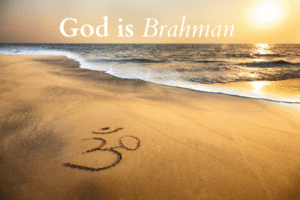There is one pure Existence from which creation has manifested. That Existence is the subtle Reality or Self of all. —Chandogya-upanishad
Who is God? The most objective understanding of who is God comes from spirituality. The spiritual science of Vedanta explains God as a supreme presence, an eternal existence because of which every being and thing in creation ever existed, is existing or will ever exist.
This eternal presence has no particular name, form or qualities. It is the fundamental limitless truth that is the innermost core, or Self within each and every thing and being.
Being everywhere and the universal support of all, Vedanta calls it Brahman which means, “the Big” or “that which supports” in Sanskrit.
 I will be using the term Brahman as a synonym for “God” in this article.
I will be using the term Brahman as a synonym for “God” in this article.
There are four questions relating to Brahman: What is its nature? Where is it located? How is Brahman to be known? What are the benefits of knowing Brahman?
Gaining the answers to these questions will help us understand our source and our connection to it.
More importantly, since Brahman is the Self within all, it is also within you and me. In fact, it is our real divine nature.
As you read the answers to the following questions, consider that you are reading about your true Self.
What is the nature of God or Brahman?
The ancient spiritual texts, the Upanishads, give us 3 fundamental indicators of the nature of Brahman. They are not three separate qualities but three aspects of the same one Brahman. They are Existence–Consciousness–Bliss.
Existence: Brahman is the ultimate Truth behind this entire creation. It is pure Existence that gives everything its existence. Being everywhere, it is infinite.
It remains unchanged in the three periods of time—the past, the present and the future. It is eternal. And so, it can never be negated, modified or destroyed.
Consciousness: This existence is not lifeless or insentient. It is a vibrant Consciousness that is all-knowing and alive. Brahman is the cause for life and sentiency in all living beings.
Bliss: This Existence–Consciousness is of the nature of pure Bliss. Because Brahman is eternal and infinite, this Bliss expresses as absolute happiness and completeness.
Where is God or Brahman?
Being infinite, Brahman is everywhere, in all names and forms of the world and beyond them as well. In other words, Brahman is both transcendental and inherent in everything.
Although it is outside and within, it cannot be experienced directly in the outer world. So long as we keep looking for God outside, we will never find it. We will only perceive the phenomenal world.
But when we turn our attention inwards in meditation, we will come to experience Brahman in our own heart as our true Self within.
How is Brahman to be known?
We gain knowledge of the world mainly in two ways—directly through our own five senses or indirectly by listening or reading about the experience of others.
Brahman is not an external object that can be perceived through the eyes, ears, tongue, nose or skin.
And neither can we have a direct experience of Brahman through someone else’s account of it. Think of how you yourself would have to eat to end your hunger. Your stomach can’t feel full from listening or reading about someone else’s experience of eating.
If Brahman cannot be perceived directly by us or known indirectly through the experience of others, how can we know it?
Vedanta gives the answer in the form of the well-known story of the 10th man.
The story of the 10th man
Ten men who were not very bright went on a day trip in nature. They came to a river and swam across it. Having swum across, the leader of the group thought it would be good to make sure that they had all made it to the other side.
And so, he made them all stand in a line and started counting—one, two, three, four, five, six, seven, eight, nine… “Oh no! We are only nine. Where is the tenth man?” he exclaimed with alarm.
All the others immediately started getting anxious. Who was the tenth man and where was he?
No matter how many times they re-arranged the group, he counted only nine people. They became grief-stricken and started lamenting the death of the tenth person.
As they sat down and cried, a kind hiker stopped and asked what had happened and why they were crying. When they explained the problem, he immediately understood.
He told them not to worry as the tenth man was indeed alive. He asked the leader of the group to count his friends again and at the end, the hiker instructed him to count himself. “You are the tenth man. You had forgotten to count yourself.”
The leader had the instant realisation, “I myself am the tenth man. Oh, what a fool I was!”
With that inner realisation, all his worries about losing the tenth man ended.
The tenth man in this story represents Brahman—the Self. The story illustrates the fact that Brahman is to be known within as our own Self. No instrument or other medium is required.
It is a direct, personal, inner realisation. I am That, declares the Upanishad.
What are the benefits of knowing Brahman?
We all want complete and permanent happiness and are searching for it from the outer world.
But the happiness that we get from the world is innately unsatisfactory. It is dependent on a precarious balance of factors remaining a certain way.
Since the world is constantly changing, the happiness that we get keeps slipping away. We then find ourselves searching for the next thing that can make us happy. It is a never-ending and futile pursuit.
The Chandogya-upanishad declares, That which is infinite alone is happiness; there is no happiness in the finite.
The ever-changing world is finite and constrained by time and space. On the other hand, being infinite and eternal, Brahman is the only real source of happiness. Realising Brahman will end all our sorrows in life just as knowing the tenth man brings instant peace.
Essential Knowledge
Learning about God or Brahman is essential because it is gaining the knowledge of our own real nature. We are not our human personality but that divine essence expressing in the human body and mind.
The goal of human life is to rediscover this divine essence within. When we do, we will gain infinite peace and complete fulfillment.
Reference: Upanishad course offered by the Chinmaya International Foundation
Like this post? Sign up for the free fortnightly Spiritual Solutions Newsletter and receive the latest articles, news and updates in your email inbox!













